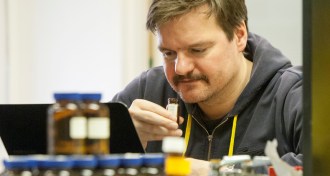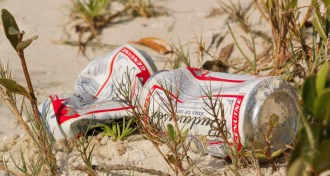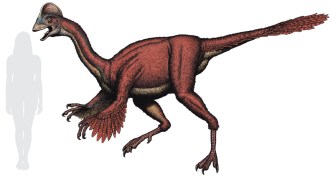All Stories
-
 Life
LifeHuman noses know more than 1 trillion odors
Sense of smell displays a vast reach in study of people’s ability to distinguish between scents.
By Bruce Bower -
 Neuroscience
NeuroscienceCalcium in alcoholism drug may be what prevents relapse
Acamprosate, one of the few drugs to treat alcoholism, may be nothing more than a vehicle for a calcium supplement.
-
 Planetary Science
Planetary ScienceHow Earth’s radiation belt gets its ‘stripes’
The rotation of the Earth may give the planet's inner radiation belt its zebralike stripes.
-
 Climate
ClimateClimate change may spread Lyme disease
The territory of the ticks that transmit Lyme disease is growing as the climate warms.
By Beth Mole -
 Paleontology
PaleontologyThe dinosaur ‘chicken from hell’
Fossils suggest that a supersized chickenlike reptile called Anzu wyliei roamed what are now the Dakotas roughly 67 million years ago.
-
 Life
LifeVitamin A deficit in the womb hurts immune development
Mice deprived of vitamin A in utero grow up with undersized immune organs.
By Nathan Seppa -
 Animals
AnimalsOwl monkeys’ fidelity linked to males’ quality of parenting
The evolution of animals’ sexual fidelity is probably linked to the intensity of male care, the researchers suggest.
-
 Animals
AnimalsLike a boomerang, relocated python comes back again
Burmese pythons, which have invaded the Everglades, can find their way home when people move them dozens of kilometers.
By Susan Milius -
 Genetics
GeneticsEarly Polynesians didn’t go to Americas, chicken DNA hints
Contamination of ancient chicken DNA may explain previous report linking Polynesians to South America.
-
 Math
MathOur Mathematical Universe
Math is everywhere: medicine, sports, banking, gambling, National Security Agency espionage.
-
 Science & Society
Science & SocietyStone throwers might toss fingerprints into police hands
An Israeli police lab is studying methods to develop fingerprints on rock to identify stone throwers.
-
 Genetics
GeneticsGiant moa thrived before people reached New Zealand
Humans probably caused the extinction of giant wingless birds called moa in New Zealand, DNA evidence suggests.